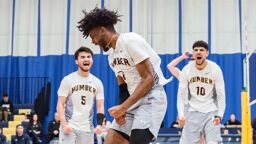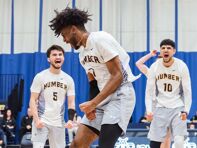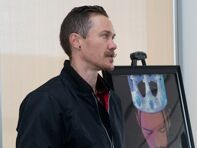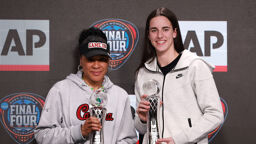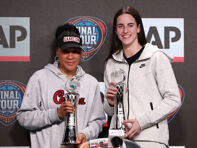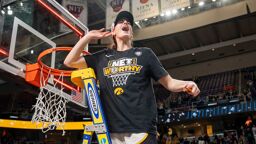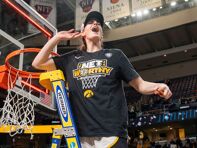Each week, Outsports stops the clock for an instant reply of the week that was. It’s our way of memorializing the glorious victories, the ignominious defeats, and the players and personalities who made them, lived them or just couldn’t avoid them.
We realize our roster may differ from yours, and we welcome your comments, contributions and critiques. We read them all! Details on how to reach us are below, after our look at this week’s winners and losers.
Winner: Australia
Australian human rights advocates and officials in charge of promoting sports on Wednesday issued a broad, inclusive set of new guidelines aimed at increasing participation down under by transgender and gender nonconforming athletes, from local clubs to national sports teams.
Get off the sidelines and into the game
Our weekly playbook is packed with everything from locker room chatter to pressing LGBTQ sports issues.
What may be the most controversial aspect of the recommendations is that they stop short of mandating standards on testosterone levels for trans women and nonbinary athletes, a point of growing contention in the United States and United Kingdom. The reason: the jury is still out, according to the authors of the guidelines. “There is limited research examining the impact of testosterone on the sporting performance of trans women.”
Government leaders and advocates gathered in a Melbourne suburb to announce the guidelines declared they were intended to “put people first.”
“Sport must be safe and inclusive for all because every Australian has the fundamental right to enjoy the wonderful benefits of sport and physical activity,” said Kate Palmer, CEO of Sport Australia, which is the brand name of the Australian Sports Commission.
Loser: South Korea
While we’re on the subject of countries, South Korean Overwatch League broadcast partners chose to not show OWL’s Pride Day festivities for the second year in a row, citing “cultural reasons.”
Few, if any, esports organizations eclipse the Overwatch League in both supporting the LGBTQ community within its fan base and giving them visibility. The young league was quick to do so, promoting a Pride Day during its first season in 2018. That tradition continued this year as the league held its 2019 Pride Day on Friday, June 7, but not all fans got the full experience.
According to Kotaku, the South Korean OWL broadcast purposefully avoided any reference to the Pride Day festivities, both visual and verbal. The majority of viewers were flooded with an audience clad in the colors of various pride flags, touting signs with pro-LGBTQ slogans like “Bi Pride,” “Play of the Gay” and “Gays into the iris” that play off of the game’s terminology.
Announcers donned rainbow armbands as they welcomed viewers to the Pride Day festivities, explicitly referring to Friday’s broadcast as one “celebrating the mutual support between the Overwatch League and the LGBTQ community.”
But fans watching in South Korea didn’t see or hear any of that. Instead, they saw a much more straight-forward broadcast, highlighting the matches with minimal reference to the day’s festivities.
South Korea, like many Asian nations, holds very conservative opinions toward the LGBTQ community. The country’s position that gay marriage is illegal speaks to those sentiments. Activision Blizzard discussed Pride Day’s implementation on South Korean broadcasts with South Korean team and broadcast partners ahead of 2018’s Pride Day. The decision was made to minimize the day’s LGBTQ presence on South Korean broadcasts for “cultural reasons,” according to an Overwatch League insider.
“Our Korean partners were aware of the event that [was hosted] in the arena and were allowed to make whatever decision they felt was appropriate for their broadcast… we gave the regional leads and their broadcast partners the autonomy to present their portion of the program as they felt best,” said the insider.
Winners: Out soccer players in the Women’s World Cup
The 2019 FIFA Women’s World Cup is underway in France, featuring 24 teams. Among them are 31 out gay, lesbian and bisexual women — 30 players and one coach.
It’s likely there are more lesbian and bisexual women on these teams than we know about, especially since some participating countries — like Nigeria, Cameroon and Jamaica punish homosexuality with prison time — and other countries still struggle with varying degrees of societal homophobia that may keep players closeted.
“While the men’s professional game has been reluctant to be fully inclusive and supportive of anyone within the game who identifies as LGBT, it’s generally regarded that football is much more accepting of women who are lesbian or bisexual,” Lindsay England, founder of Just A Ball Game, an organization that works to end anti-LGBT bias in soccer, told Outsports,
While there may be more out women than men in professional soccer (there were no out men at the 2018 World Cup), another disparity also exists between the two: The 2019 Women’s World Cup prize money is $30 million — 7.5% of the Men’s World Cup prize.
Losers: Beach volleyball players at The Gay Games
(or, Winners: Dodgeball and eSports players at The Gay Games)
The Gay Games eliminated competitions in billiards, vertical running, mountain biking and, most surprising, beach volleyball to make room for two new sports at 2022’s Gay Games 11. The Hong Kong-hosted competition will include dodgeball and esports for the first time.
The decision follows recent trends within international athletics, LGBTQ and otherwise. Esports has become a multi-million dollar industry featuring top-level LGBTQ athletes across multiple disciplines, such as Dominique “SonicFox” McLean, Sasha “Scarlett” Hostyn and Austin “Muma” Wilmot.
Adding esports will likely provide the Gay Games a familiar foothold during its first Asian-hosted competition as the medium is immensely popular throughout the region. The sport’s inclusion follows its addition to the Sin City Classic in 2019 and inquires by the International Olympic Committee.
Dodgeball’s popularity has grown exponentially among the LGBTQ community. Dodgeball leagues have popped up in nearly every major U.S. city over the last decade. The sport has also become an attraction of the Sin City Classic since its addition.
“While compiling the list we wanted to make sure that we struck a good balance between traditionally popular sports among Gay Games participants from around the world, and sports enjoyed in the region like Dragon Boat Racing and Dodgeball, as well as new disciplines like E-Sports,” said Gay Games Hong Kong sports director Sabrina Yang. “It was a bit of a challenge, but I think we have succeeded.”
Winners: JayCee Cooper and other transgender powerlifters
A group that advocates for gender equality has lodged a complaint of discrimination against USA Powerlifting with the Minnesota Department of Human Rights on behalf of a transgender athlete, JayCee Cooper.
Minnesota-based Gender Justice accuses USAPL of violating a landmark 1993 law that prohibits discrimination on basis of sexual orientation and identity, the first in the nation to protect trans Americans.
As Outsports has reported, USAPL blocked Cooper from competing in Minnesota’s State Bench Press Championship in January, even though she met the organization’s policies for competition and disclosed her gender identity.
USAPL’s response was to issue a new, retroactive blanket ban on transgender athletes, which the organization staunchly defends as a “transgender participation policy.” The policy,however, does not allow participation by trans athletes. In interviews with news media, in social media posts and within the policy itself, USAPL has opposed all characterizations of that policy as a ban.
Losers: Everyone who thinks athletes should be required to sing the national anthem at sporting events
The whole world seems to be watching the Women’s World Cup, but the attention of some viewers in the United States is more focused on a pre-game ceremony, one in which U.S. Women’s National Team forward Megan Rapinoe has refused to take part: the singing of the national anthem.
Rapinoe first made headlines in 2016 when she took a knee during the national anthem to support NFL player Colin Kaepernick’s protestof the systemic oppression of people of color in the U.S., the first white athlete and first female athlete to follow his lead.
As a result, soccer federation officials issued a new by-law mandating that players “stand and honor the flag,” a decision Rapinoe derided in an interview last month, calling it “a backwards rule.”
“I’ll probably never put my hand over my heart,” she told Yahoo Sports. “I’ll probably never sing the national anthem again.”
Why? Isn’t she worried about a repeat of the backlash in 2016 that hurt her standing in her hometown, impacted her business and caused so much heartache for her family? All these questions were asked by reporter Henry Bushnell, who also asked Rapinoe: Isn’t it a contradiction to wear the Team USA uniform but not sing the national anthem?
“Not really,” Rapinoe told him. “Because I feel like I’m a walking protest.”
The USWNT co-captain came out in 2012 and ever since has been a fierce advocate for LGBTQ rights and for pay equity. She said prior to the 2016 election, “things got kind of nasty” in America, and she had what she calls an “awakening.”
Rapinoe explained she will continue to represent the federation, which incidentally she’s suing for “institutionalized gender discrimination.” And in her interview she specifically lashed out at the Trump Administration for what she called its failure to “value all Americans equally.” Rapinoe described the U.S. as suffering from an epidemic of “atrocities … extreme poverty … homelessness … mass incarceration … discrimination against people of color, and police brutality.”
From The Hill to Fox News to The Daily Caller, right-wing media and conservative social media users have once again targeted Rapinoe as a result of her choice to not sing, even though any casual observer at most U.S. sporting events will find many athletes and fans who don’t sing along.
Rapinoe actually hasn’t sung the anthem for months, but one thing the Yahoo Sports interview made clear is that she used to sing the Star Spangled Banner, and with genuine feeling. Her family said in an interview she is extremely patriotic. Ultimately, Megan Rapinoe said she does not sing the national anthem because she is “a walking protest when it comes to the Trump administration,” and because her silence is emblematic of “everything I stand for.”
Winner: Gritty
Last weekend, Philadelphia held its “largest ever” Pride Parade through Center City. And amidst the usual menagerie of floats, costumes, and celebration, a bit of news emerged that marked one of the most exciting developments to hit Philly’s LGBTQ community in the past year:
The Philadelphia Flyers are one of many NHL teams to enter their city’s Pride Parade. And in 2019, they decided to up the ante on the rest of the league by making hockey’s most popular mascot front and center.
At the beginning of the 2018-19 season, the Flyers unveiled Gritty, who looked like the answer to the question “What if the Jim Henson company created a muppet out of the ‘Two Minutes for Cross Checking’ penalty?” Simply put, from the day his costume first leaked to the internet, Gritty was Philly sports culture.
And during Pride, Gritty again stole the city’s heart, leading the Flyers parade float with rainbow flag proudly in hand. As if to make his feelings about inclusion as clear as possible, Gritty took time from marching in the parade to tweet the following sentiment: “I love LOVE.”
I love LOVE. 🌈 pic.twitter.com/pvqpksL56Z
— Gritty (@GrittyNHL) June 9, 2019
It gets better. Look closely at the rainbow flag in Gritty’s orange hands. It includes brown and black stripes and according to Teen Vogue, it’s meant “to represent the racial diversity of the LGBTQ community.” This special Pride flag also originated in Philadelphiam so in one image, Gritty represents the coming together of all races and sexualities in a show of city pride. Not bad for a mascot less than 1 year old.
Winners: Our out athletes
Ryan Marker hid who he was from the rest of the world until his family, coaches and teammates came through when he needed them most.
With an All-American tennis star at Arizona for a sister and two self-made entrepreneurs as parents, University of San Francisco tennis player Ryan Marker came from a family of achievers. And now his achievements are being spotlighted, as the USF Athletic department has released a new video telling his coming out story as part of its “Behind The Mask” YouTube series.
Jake Barreau has found personal and professional success at the University of Oklahoma as a coach who is gay and married.
I am a gay man. I just couldn’t get myself to share it. When I finally started being open about my personal life with my work family, I felt a huge weight lifted. I also felt an outpouring of love.
For Emma Gee, a bisexual BYU runner, ‘coming out has proven difficult, confusing, awful, heartbreaking and wonderfully liberating.’
I am the only out LGBTQ athlete at BYU.
A lonely label and a sad reality.
Because, between you and me, I’m not the only athlete at BYU who is LGBTQ.
Winners: The gay couple who got engaged at a Nationals game
One gay man knew exactly how he wanted to make the 2019 Washington Nationals Night Out a lifelong memory, using the event to propose to his boyfriend. At the top of the seventh inning, Aaron got on one knee and popped the question to Teddy, according to MLB and People. Teddy said “Yes.”
You can see video from the emotional moment in a lovely tweet from the Nats Youth Academy. The Nationals also tweeted that the club “couldn’t be happier for Teddy and Aaron.”
The fans in the stadium equally reacted with applause and reportedly a standing ovation.
That’s all for this week! We’ll bring you a fresh list of winners and losers next Saturday. Got a name we missed, or want to challenge our choices? Comment here or on Facebook or Instagram,tweet at us, message us via any social media, or just plain email us at [email protected] Thanks!







